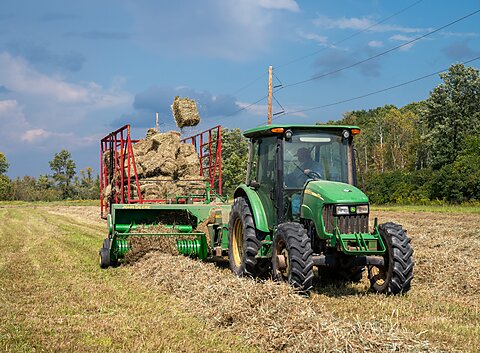Clark Packard
Last week, dozens of members of the House Republican Study Committee introduced the Countering Communist China Act (CCCA), which would, among other provisions, revoke Beijing’s Permanent Normal Trade Relations (PNTR) status and dramatically increase tariffs on all imports from China. The legislation comes on the heels of the House Select Committee on the Chinese Communist Party’s (Select Committee) report recommending a similar policy late last year. My Cato colleague Scott Lincicome and I documented the myriad problems with revoking PNTR in a blog post last year, but it is worth pointing out that it would be particularly bad for American farmers and ranchers.
First, American farmers and ranchers are consumers. Revoking PNTR and then raising taxes significantly on all imports from China—to about 32 percent if China were moved to column 2 of the Harmonized Tariff Schedule as proposed in the bill—would raise prices on everyday household items as well a number of farm products and equipment from China, including fertilizer. Increased input costs would make American farm products less globally competitive.
Likewise, the bill would inevitably lead to Chinese retaliation against American goods and services exports. This is not idle speculation; it is exactly what happened when the Trump administration levied tariffs on Chinese imports. China hit American exports—particularly agricultural products—with significant tariffs in retaliation. Today, China’s retaliatory tariffs are imposed on about 60 percent of American products at a rate of about 21 percent, which had a very clear detrimental impact on American exports.
Take soybeans, for example. A 2022 US Department of Agriculture (USDA) study found that soybeans accounted for 71 percent of US agriculture losses during the trade war. A 2021 paper for the China Economic Review found that, as a result of the trade war, China increasingly purchased soybeans from Brazil instead of the United States. In 2023, Bloomberg noted that Brazil increasingly dominates China’s massive soybean market while the US lags behind, which was not the case in the decade prior to the trade war. Last month, Bloomberg similarly reported that “American farmers have started to lose their dominance in global grain shipping as Brazil strengthens its position,” as US farm income is set to experience its biggest slump since 2006.
The nearby chart shows foreign purchases of American soybeans began to fall during the height of the US‐China trade war between 2018–2020. Though purchases of American soybeans have rebounded slightly, the US is still lagging well behind Brazil.
It’s not just soybeans that were affected by Chinese retaliatory tariffs. The USDA estimates that the value of sorghum exports to China fell by nearly 95 percent, oil seed values fell more than 90 percent, tobacco fell nearly 100 percent, wheat fell nearly 90 percent, pork fell by nearly 70 percent and beef fell by nearly 35 percent during the trade war. In total, the value of agricultural exports to China fell by 76 percent during the trade wear, which resulted in an approximate loss of nearly $26 billion in 2019. The losses from the trade war were concentrated in Midwestern states, including Iowa, Illinois, Kansas, Minnesota, Indiana, Nebraska and Missouri.
The fallout was so severe for American agricultural exporters that the Trump administration had to dust off a New Deal‐era program, the Commodity Credit Corporation, to funnel about $30 billion worth of payments to farmers and ranchers hurt by foreign retaliation. The payments have dried up, but the market losses continue. To be clear, the 2018–2020 episode would be minor compared to the type of retaliation China would impose on American agriculture if the US revoked PNTR and raised tariffs on all Chinese products entering the US at an average rate of above 30 percent as the bill would do. Fiscal conservatives worried about the ballooning debt and opposed to crony capitalism should be particularly concerned with the prospect of more taxpayer‐funded bailouts.
Not everything in the CCCA is bad for American agriculture. The bill seeks to expand trade and investment with allied and Asia‐Pacific nations, which tend to heavily protect their agricultural markets. Specifically, Section 105(d) of the bill authorizes the executive branch to enter into trade negotiations and trade agreements with Taiwan, the Philippines, Indonesia, Thailand, Malaysia, New Zealand and the United Kingdom. Meanwhile, Section 105(e) would apply expedited fast track congressional consideration of such agreement(s). This is a good start, but it should go further and include Japan, arguably the United States’ most important ally in the world right now, as well as Vietnam. While this certainly wouldn’t make up for lost access to China’s massive market, it could mitigate the fallout a bit.
The United States has very legitimate complaints about Chinese international trade and investment practices, particularly surrounding technology, which should be met with a straightforward, comprehensive response from Washington, as Scott Lincicome and I laid out in a Cato policy analysis last year. But raising taxes dramatically on American consumers and conscripting American farmers and ranchers into a trade and technology war won’t change Beijing’s predatory behavior.
























